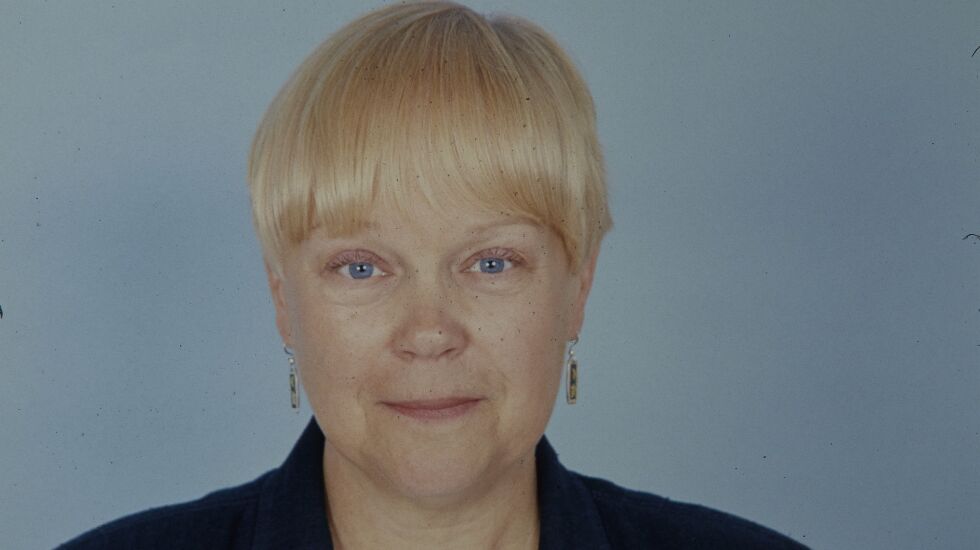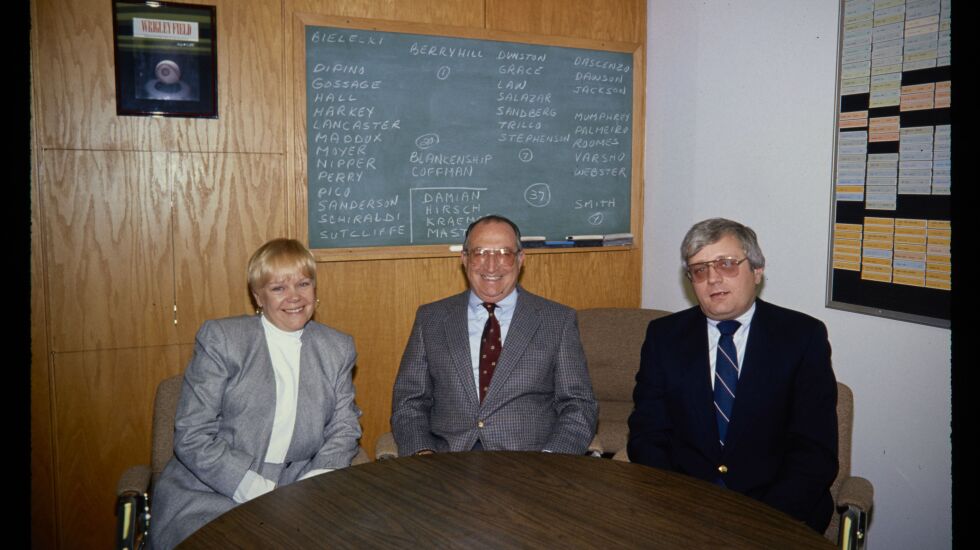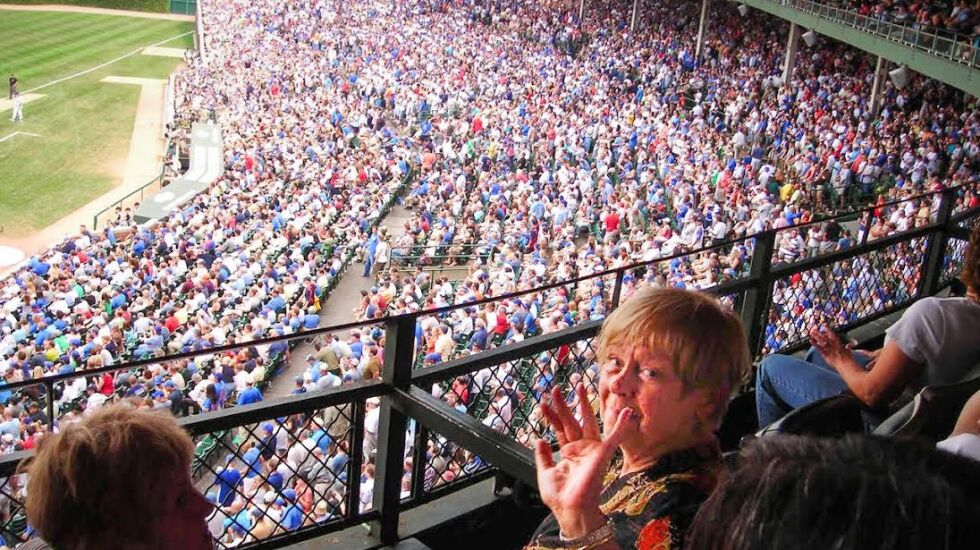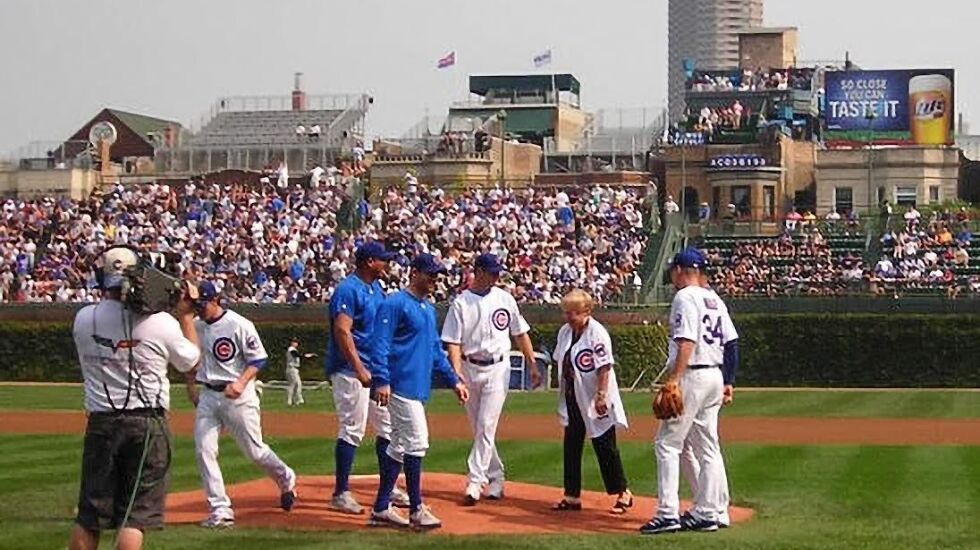
When Ed Lynch came to the Chicago Cubs in 1994 as general manager, player contracts had to be scrutinized for any mistakes the old-fashioned way — looking over spelling with your eyes, not an electronic spell-check.
“If we messed up with a typo, the player could become an unrestricted free agent,” Lynch said. “We had to go through it line by line, triple-check everything. If it had a wrong amount, a wrong address, if you put a comma in the wrong place, that could lead to you losing that player.”
He relied on Arlene Gill as a trusted final proofreader. During 35 seasons with the Cubs, she was an even-tempered, extraordinarily capable assistant to Lynch and seven other general managers.
Ms. Gill, 79, died Aug. 11 at a nursing home in Aurora. She had a history of heart trouble and strokes before succumbing to dementia, according to her brother Bud Nykaza.
She wasn’t always a Cubs fan. In her teens, she belonged to a White Sox fan club. Young Arlene and other fans once even got to ride in a pink Cadillac with Sox star Minnie Minoso, according to her brother.
After going to work for the Cubs, Ms. Gill became a lawyer-like expert on the Baseball Bluebook, a bible on matters including “free agency and multiyear deals and no-trade clauses and perks,” according to Cubs historian Ed Hartig.
The Bluebook also listed “every hotel where the teams stayed, who the broadcasters were, the addresses of the ballparks,” said Mary Dease, a former co-worker in the Cubs’ front office. “She had just incredible knowledge of the rules and regulations for acquiring players — how many players you could have on your roster and the rules for sending someone to the injured list or the minors. It took a lot of paperwork and a lot of moxie.”
Ms. Gill fielded sensitive calls from players and their families and agents. At one point, an agent for Cubs star Andre Dawson — after being stymied in attempts to meet with GM Dallas Green — left Dawson’s contract proposal in a sealed envelope with Ms. Gill.
“She kept secrets, she didn’t talk,” said Chuck Shriver, a former public relations director for the Cubs and the Sox.

“She had an excellent sense of humor and could more than hold her own in the decidedly male environment of baseball at the time,” former Cubs GM Andrew MacPhail said. “Coming to work, regardless of the current team’s performance, was always made easier knowing that Arlene would be there.”
In addition to working with MacPhail, Lynch and Green, she was an administrative assistant for Bob Kennedy, Herman Franks, Jim Frey, Larry Himes and Jim Hendry.
She was with the team through the expansion of the National League and the American League from 20 to 30 teams, the influx of players from Central America, South America, the Caribbean and Asia that international scouting brought, the addition of lights and, with that, the advent of night games at Wrigley Field and the end of 60 years of Wrigley family ownership with the sale of the team to the Tribune Company.

She’d been an elementary school teacher for a few years before going to work for the Cubs, which might have helped when she looked out for young minor league players at spring training in Scottsdale, Ariz.
Ms. Gill had “no kids — except the Cubs,” her brother said.
She was very sentimental, he said, always, for instance, crying on opening day of the season.
She grew up near Chicago and Western avenues. Her mother Angeline was a seamstress, and her father Leon was a supervisor at the main post office. Ms. Gill graduated from Good Counsel High School and went on to Northern Illinois University.
A friend who was leaving the Cubs organization encouraged her to apply for a job there. In 1967, she got hired.
Back then, the Bears were four years away from leaving Wrigley for Soldier Field. One of them used her “Bug” for a practical joke, her brother said: “My sister drove a Volkswagen, so, after practice, a Bears player picked it up and put it between two posts.”
She worked for the Cubs until 1974, then left to join the Chicago Sting soccer team, where she was an assistant general manager. She returned to the Cubs in 1981 and remained until her retirement in 2007.

Ms. Gill loved shopping at Bloomingdale’s, Bonwit Teller and I. Magnin.
“She was always a Chicago girl,” her brother said, “and always [lived] downtown.”
A celebration of Ms. Gill’s life is being planned.







